This Beautycounter sunscreen review outlines why it is the best non-toxic mineral sunscreen! It goes on clear, is safe for your health and comes in a lotion, stick and a spray. Made with non-nano zinc oxide it's also reef safe and free from fragrances, parabens and phthalates.
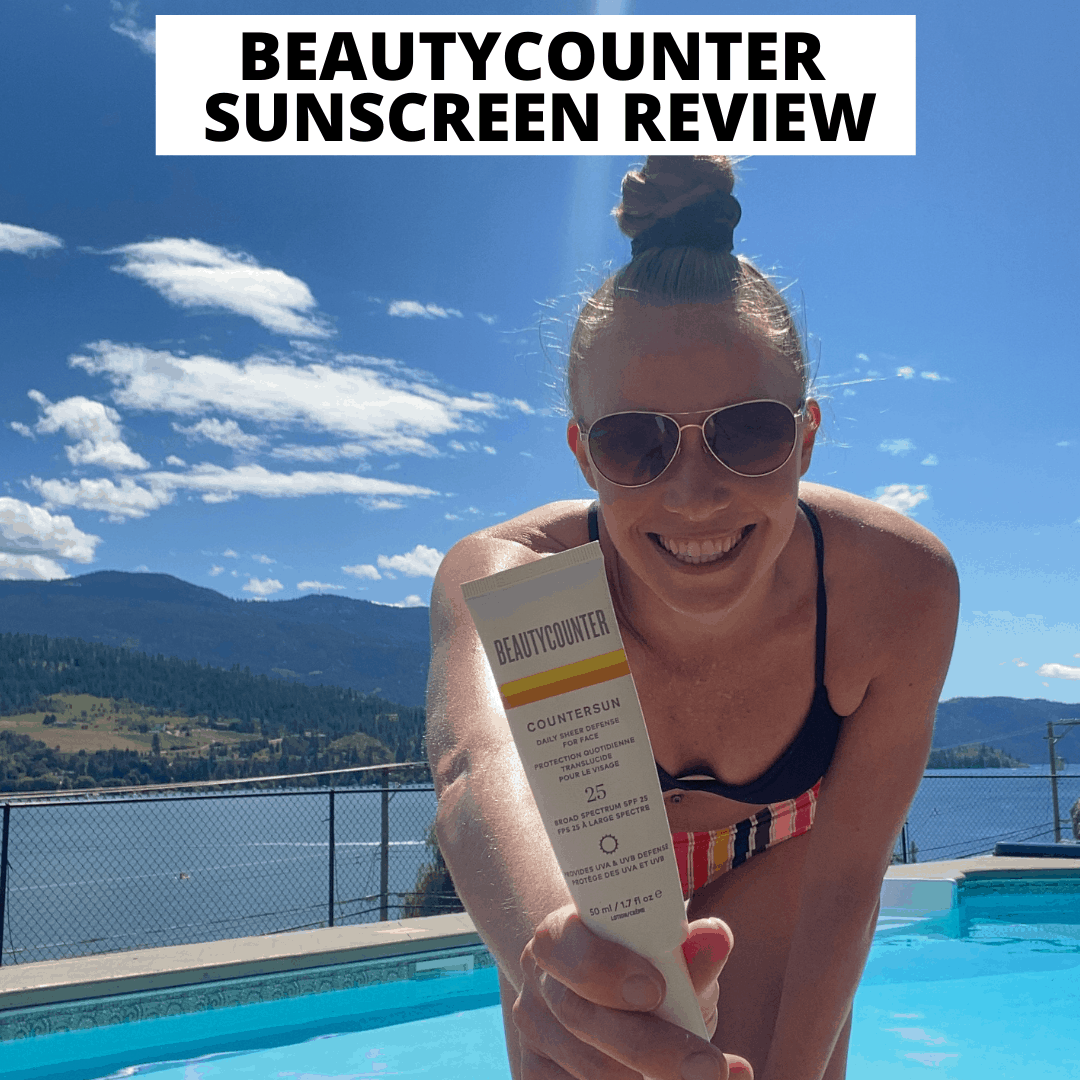
Would you like to save this for later?
Disclaimer: some of the links in this post are affiliate link where I make a small commission if you order the product through that link. This does not cost you anything extra and helps me keep this website running.
Table of Contents
Beautycounter Sunscreen Review
Wearing sunscreen is important if you are going to be in the sun for any prolonged period of time. We know that too much sun exposure can lead to sunburns, skin cancer as well as premature aging of the skin so it is important to keep yourself and your family protected. But every sunscreen is not created equal.
In my quest to find a great non-toxic over-the-counter mineral sunscreen I have tried many different brands. The problem is that many of them just didn’t work well for me (as in I burned so badly!) or they were so thick and pasty that I ended up looking and feeling like a ghost covered in cement.
For me, finding a sunscreen that not only worked well but is safe for health was a must. Fortunately, a couple years ago I found Beautycounter’s sunscreen. And not only does it work really well. But it’s formulated with ingredients that are safe for our health. And goes on nice and clear, without any white cast and also smells really good.
All of the Beautycounter sunscreens are formulated with non-nano zinc oxide which offers protection against UVA and UVB rays. And most of them also contain California poppy to block blue light. So here is my long overdue review of the Beautycounter sunscreen and why I think it’s the best over-the-counter mineral sunscreen.
Highlights of the sunscreen:
Before we get to my full review, here is a quick summary of the pros of the Beautycounter sunscreen:
- It’s both water resistant and sweat resistant so it’s great for swimming, running, hiking, biking or for use on hot summer days.
- Most of the products are SPF 30 which is the ideal SPF value for sun protection (you can read why SPF 30 is the ideal value here).
- It is reef-friendly and reef safe.
- It goes on clear with no white cast.
- The sunscreen is mineral-based instead of chemical-based and is made with non-nano zinc oxide.
Beautycounter sunscreen options:
Beautycounter makes a few different SPF products depending on what you are looking for including:
Countersun Mineral Sunscreen Lotion
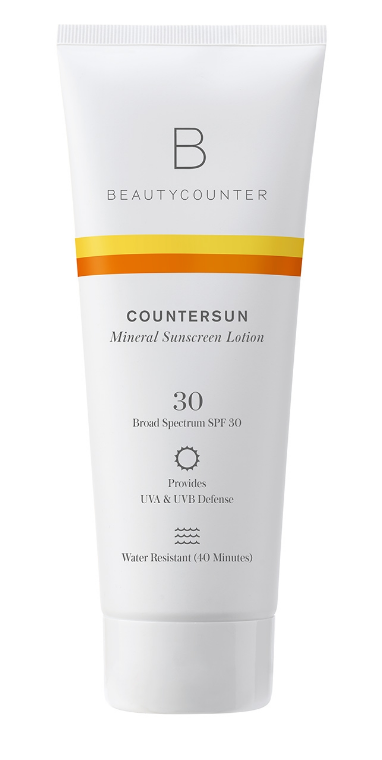
Countersun Mineral Sunscreen Lotion - This is their SPF body lotion which is my personal favourite body sunscreen. This SPF 30 lotion blocks both UVA and UVB light. And is also formulated with California Poppy to block blue light. It is water resistant for up to 40 minutes. It's also safe for children 6 months and older. It goes on nice and clear, leaving no white cast, and blends really easily.
Size and price: $43 USD for 198 mL or 6.7 oz
Countersun Mineral Sunscreen Stick
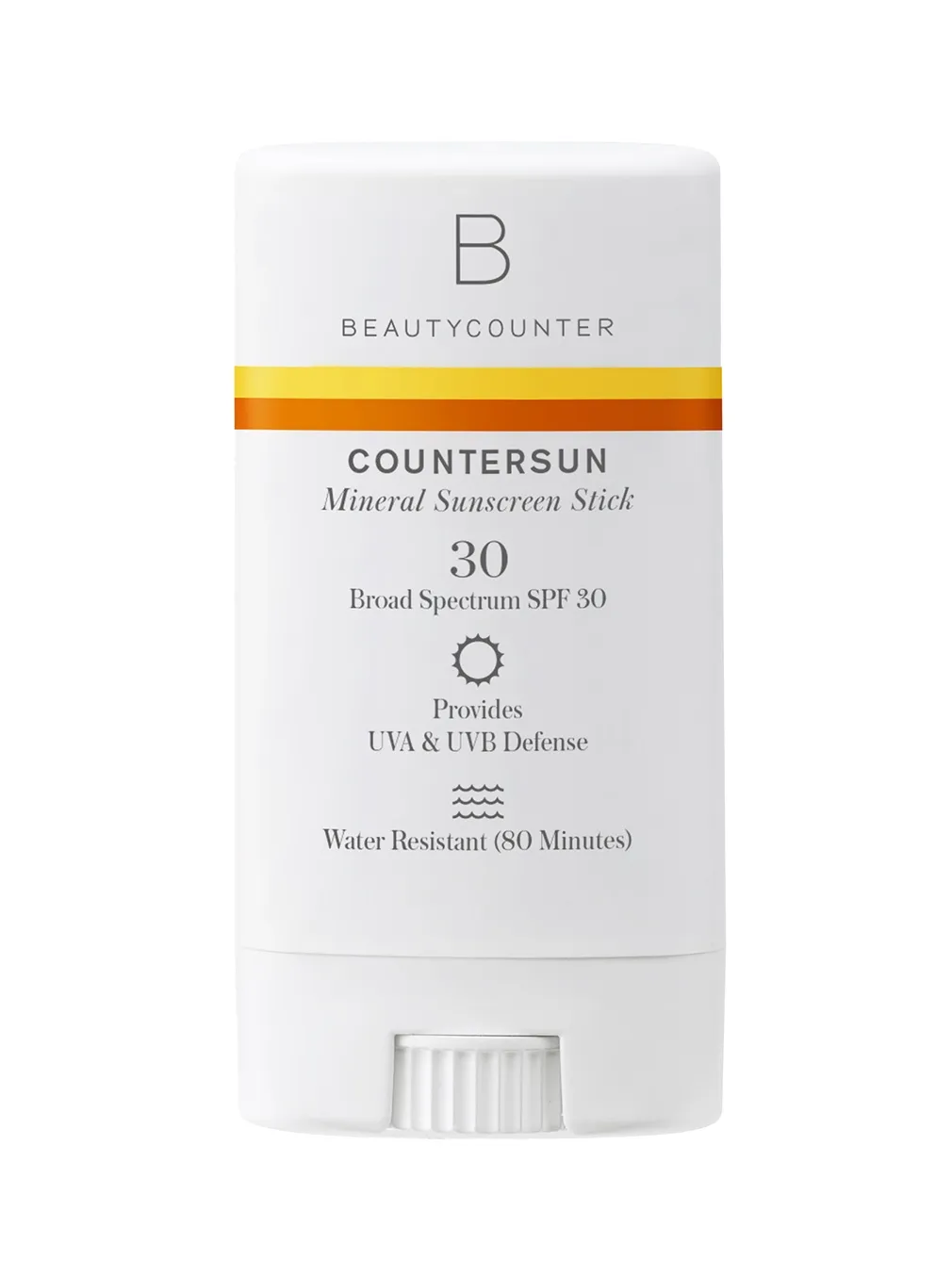
The Countersun Mineral Sunscreen Stick - My clients with kids love this product! It's easy for them to use and is small enough to keep in your purse or diaper bag. Like the sunscreen lotion this also blocks UVA and UVB rays as well as blue light offering broad spectrum sun protection. It is SPF 30 and is water-resistant for up to 80 minutes. And is also safe for children 6 months and older.
Size and price: $23 USD for 15g or 0.5 oz
Countersun Mineral Sunscreen Mist
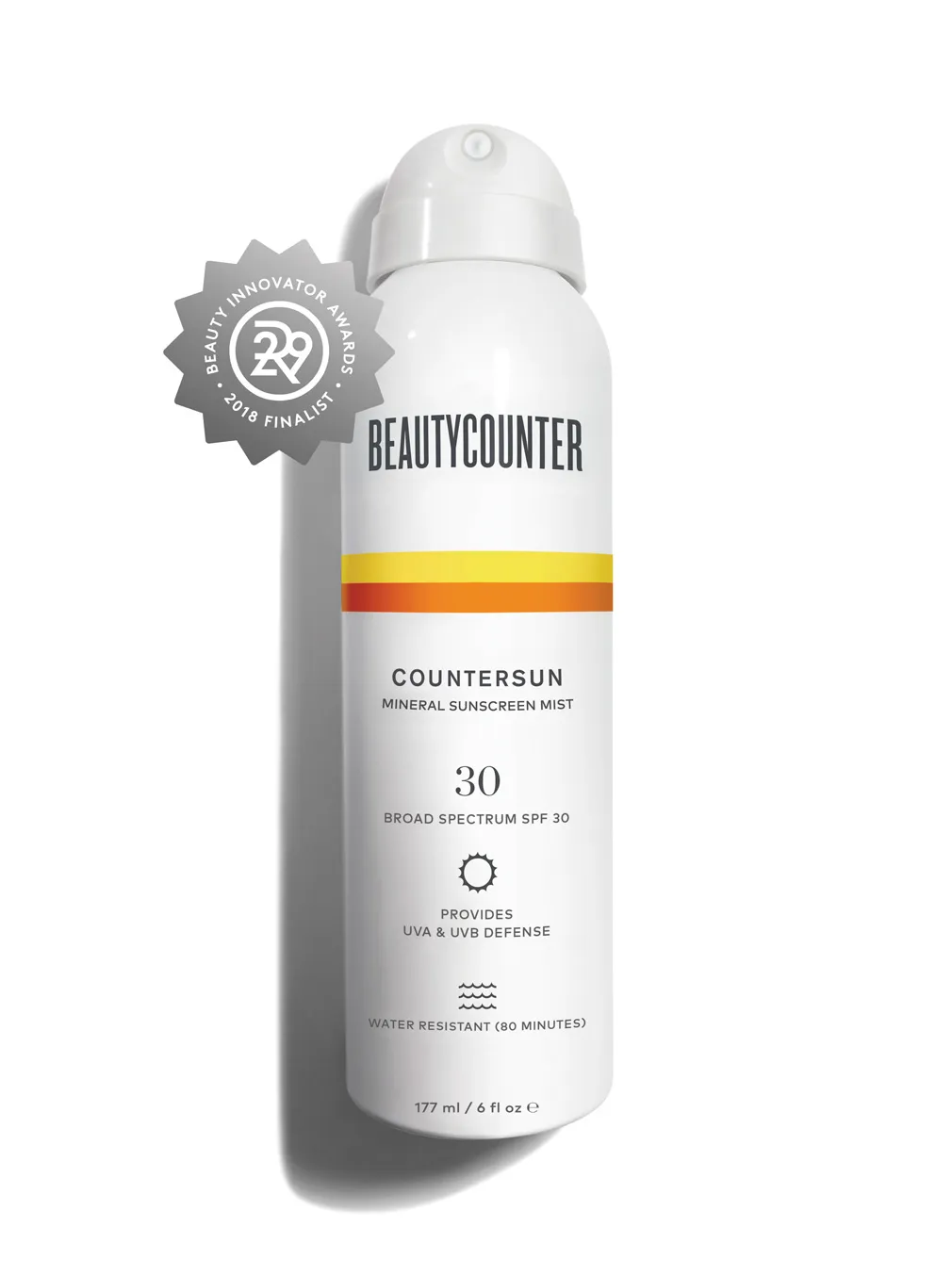
Countersun Mineral Sunscreen Mist - Another favourite for those with kids. And don't worry, this product is formulated without aerosol chemicals and instead uses air pressure technology to propel the liquid out of the container. This sunscreen was nominated for a Beauty Innovator award for this development.
Like the other sunscreen formulas it blocks UVA, UVB and blue light and is water resistant for up to 80 minutes. It has an SPF of 30.
Size and price: $39 USD for 178 mL or 6 oz.
Countersun Daily Sheer Defense for Face
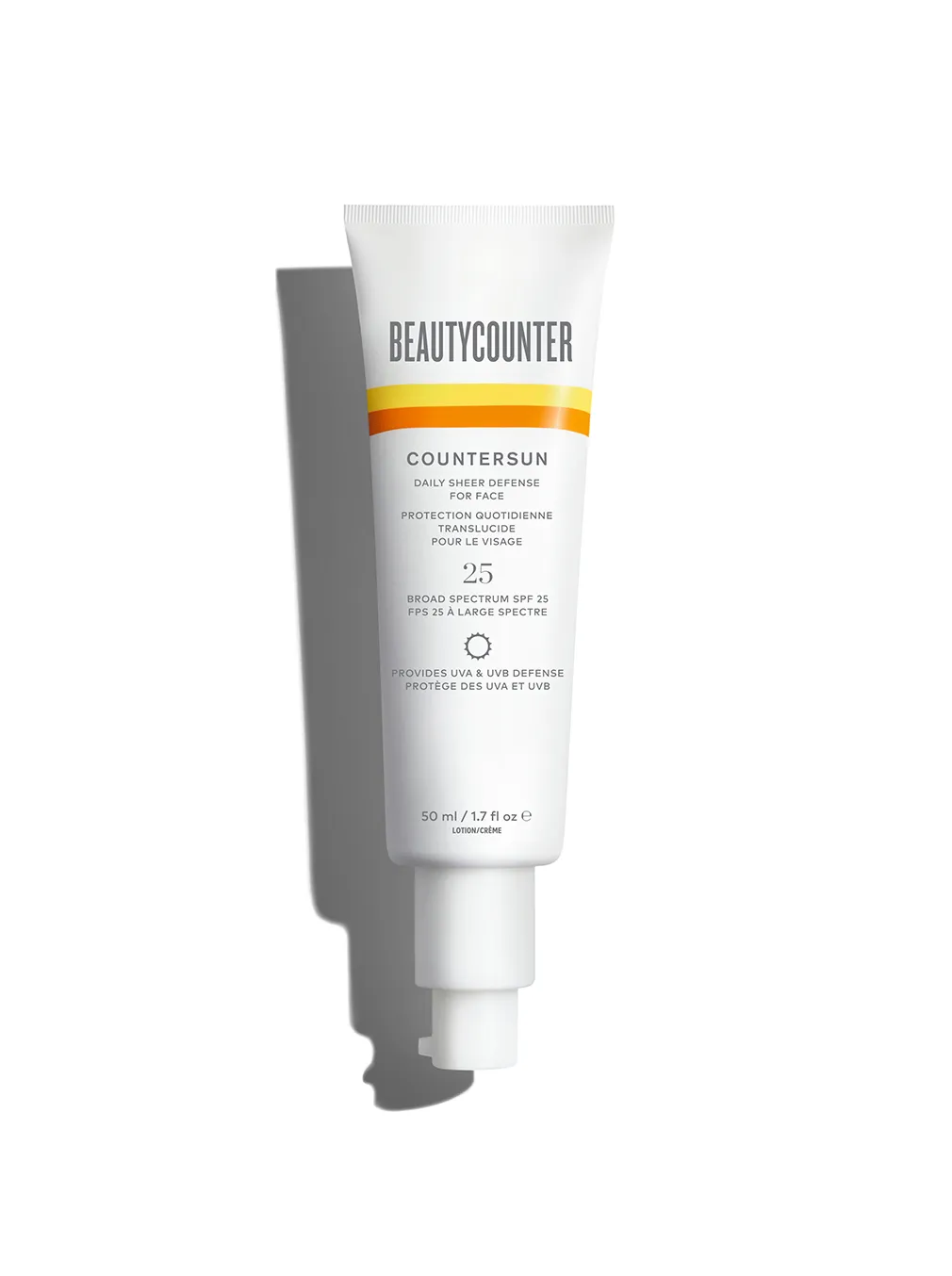
The Countersun Daily Sheer Defense for Face - This is the best face sunscreen! It goes on nice and clear without any white cast. And also has moisturizing properties to keep your skin nice and hydrated. It has an SPF of 25 and protects from UVA, UVB, and HEV blue light rays meaning it offers broad spectrum sun protection. It contains antioxidants such as vitamin E to help protect the skin from pollution. Plus chicory root extract and squalene to help lock in moisture and keep the skin hydrated.
Size and price: $46 USD for 0.5 mL or 1.7 oz.
Dew Skin Tinted Moisturizer
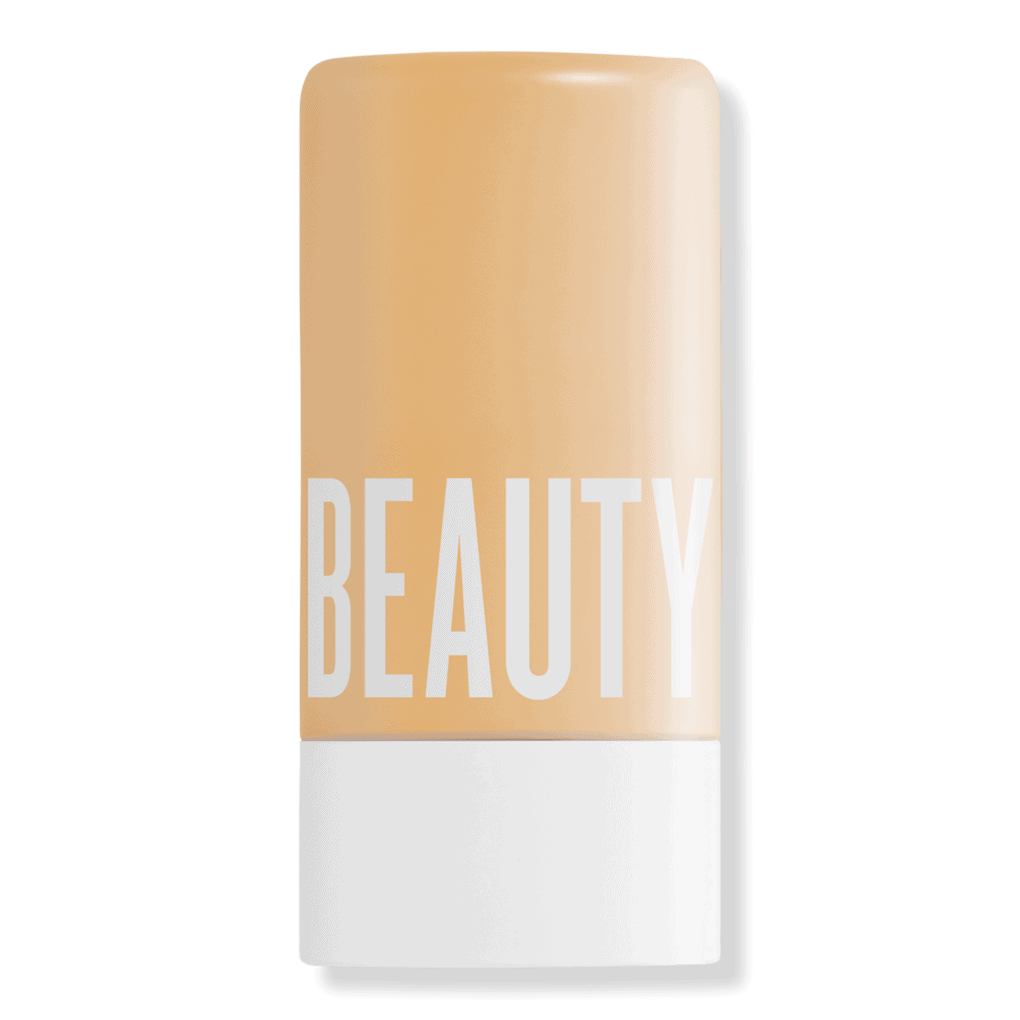
Dew Skin Tinted Moisturizer - This is one of my all time favourite Beautycounter products. It gives your skin the nicest dewy glow. I use it every single day, even in the winter. It provides an SPF 20, and blocks UVA and UVB rays. The formula features a blend of black currant seed oil, peony root extract and vitamin C to help brighten the skin and even skin tone. The Dew Skin has also been clinically proven to increase skin firmness and elasticity.
Size and price: $50 USD for 40 mL or 1.35 oz.
Key ingredients:
Non nano zinc oxide
Beautycounter uses non nano zinc oxide as the active ingredient in all their sunscreens. Zinc oxide is a type of mineral sunscreen which works by blocking your skin from the sun’s rays. Mineral sunscreens are the only type of sunscreen that I recommend using as there are health concerns and environmental concerns with chemical sunscreen ingredients.
Nano particles are very small particles, so the term non nano means that the zinc oxide used is large enough that it won’t penetrate the skin or be easily inhaled. Hence it’s safer for your health!
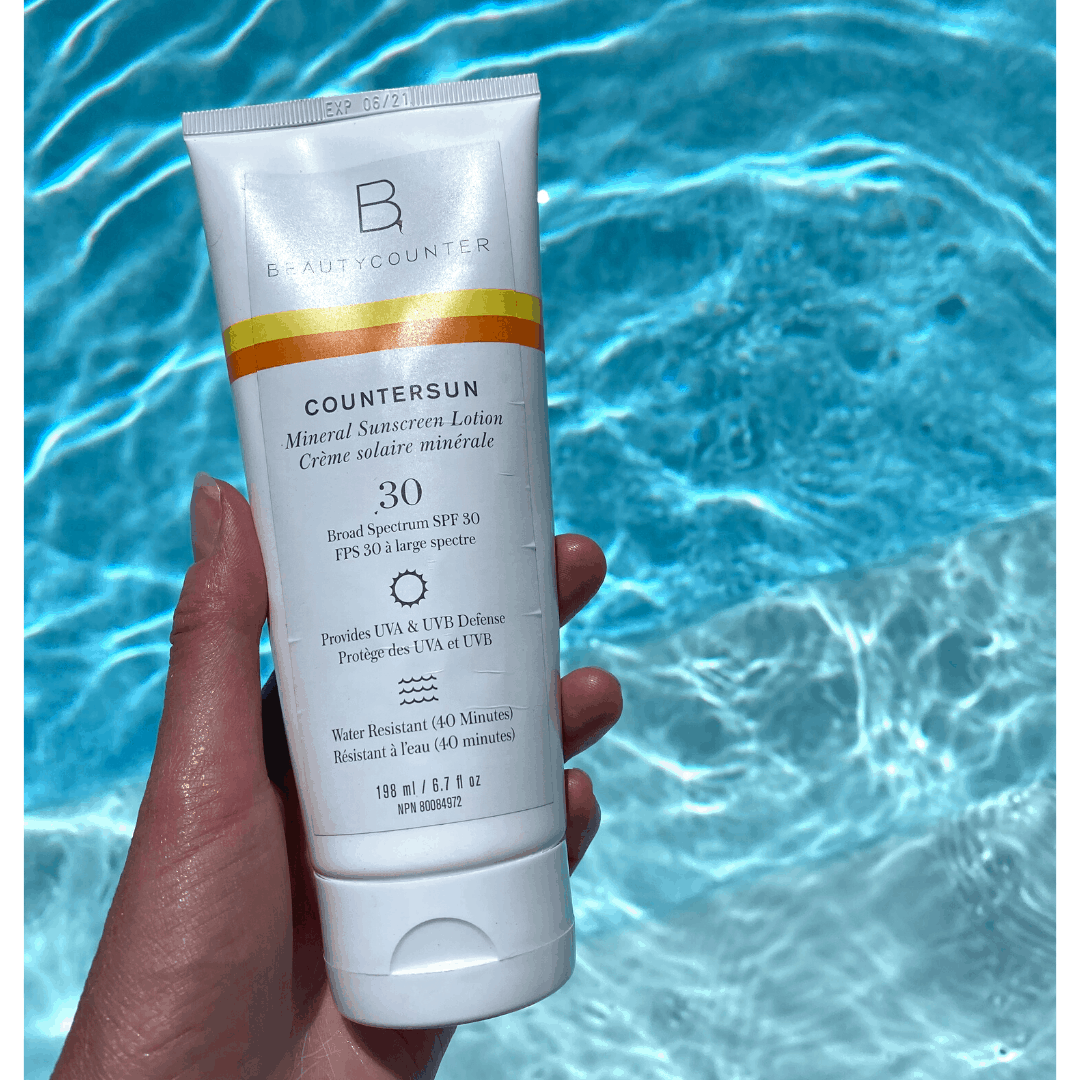
California poppy
California poppy is rich in antioxidants and helps reinforce the skin’s defense against oxidation, which can lead to wrinkles and hyperpigmentation. As well, California poppy is used to block blue light which can also be damaging to the skin.
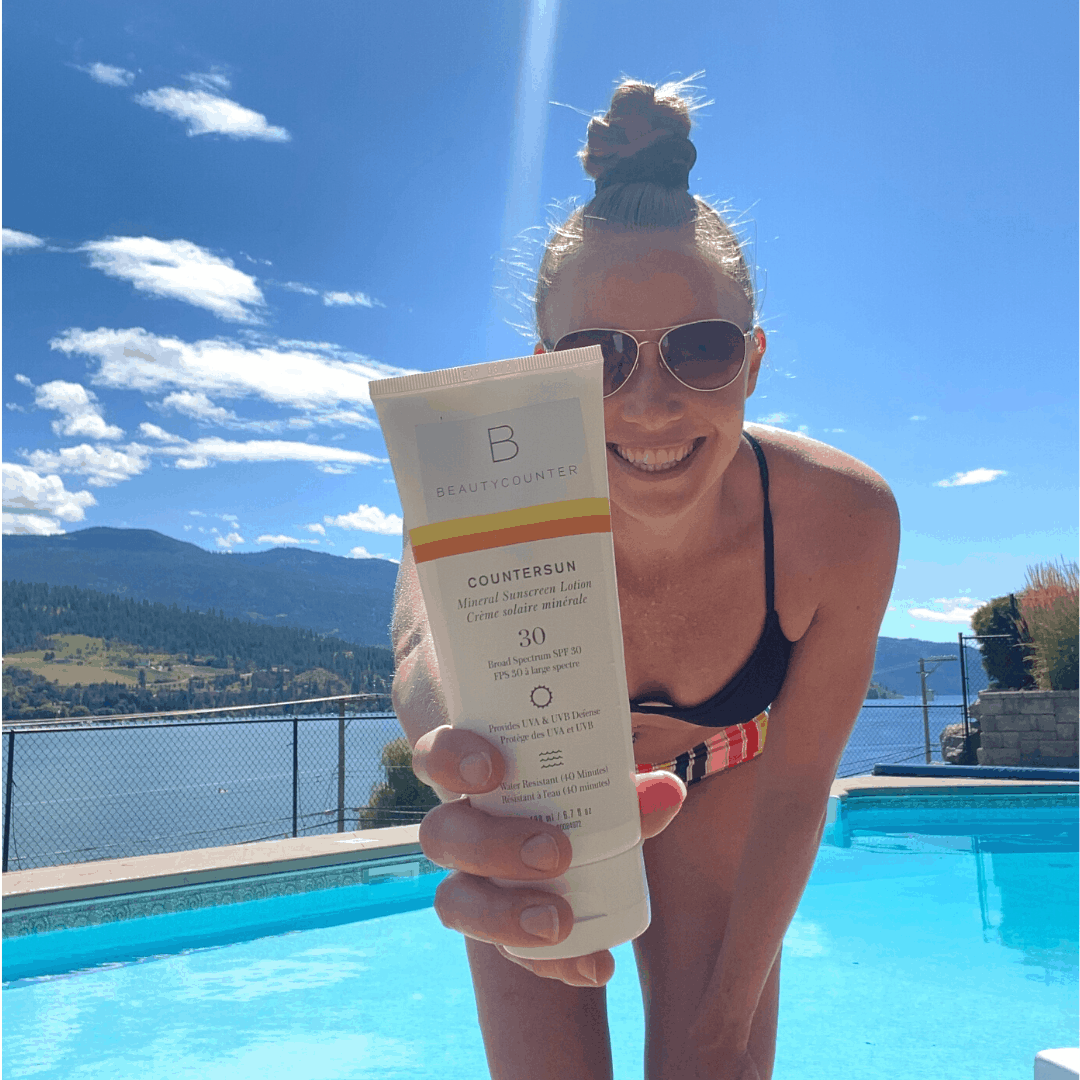
Sunscreen safety:
Formulating products that are safe for health is a priority for Beautycounter. They will never use ingredients that are questionable when it comes to safety or toxicity.
In case you didn’t know, the active ingredients in sunscreens come in two forms: mineral and chemical filters. The most common sunscreens on the market use chemical filters. Many of these sunscreens contain a combination of two to six of these chemical filters. Including chemicals like oxybenzone, avobenzone, octisalate, octocrylene, homosalate and octinoxate. Mineral sunscreens on the other hand use zinc oxide and/or titanium dioxide.
The problem with the chemical sunscreen ingredients is that they can be bad for our health. You can learn more about this in my post, The Safest Sunscreens That Actually Work. But to summarize, these chemical filters can act as hormone disruptors and they can also cause allergic skin reactions.
Of the chemical sunscreen ingredients, oxybenzone is one of the more problematic ingredients. It can act like an estrogen in the body and has anti-androgenic effects. And for breastfeeding women, oxybenzone and other chemical filters can end up in breast milk. As well, oxybenzone is bad for the environment and contributes to the destruction of the coral reefs.
Mineral sunscreen barriers don’t penetrate the skin like chemical barriers do. Meaning that they can’t impact your internal organs or hormones like chemical barriers can and are therefore a healthier option.
Additionally, Beautycounter tests every batch of their products for contaminants to ensure that no unwanted or harmful ingredients end up in their products. Because they test their products for contaminants this ensures that harmful chemicals (such as benzene) don't end up in the final product. They also formulate their sunscreen without fragrances, parabens or phthalates which can also be hormone or endocrine disruptors.
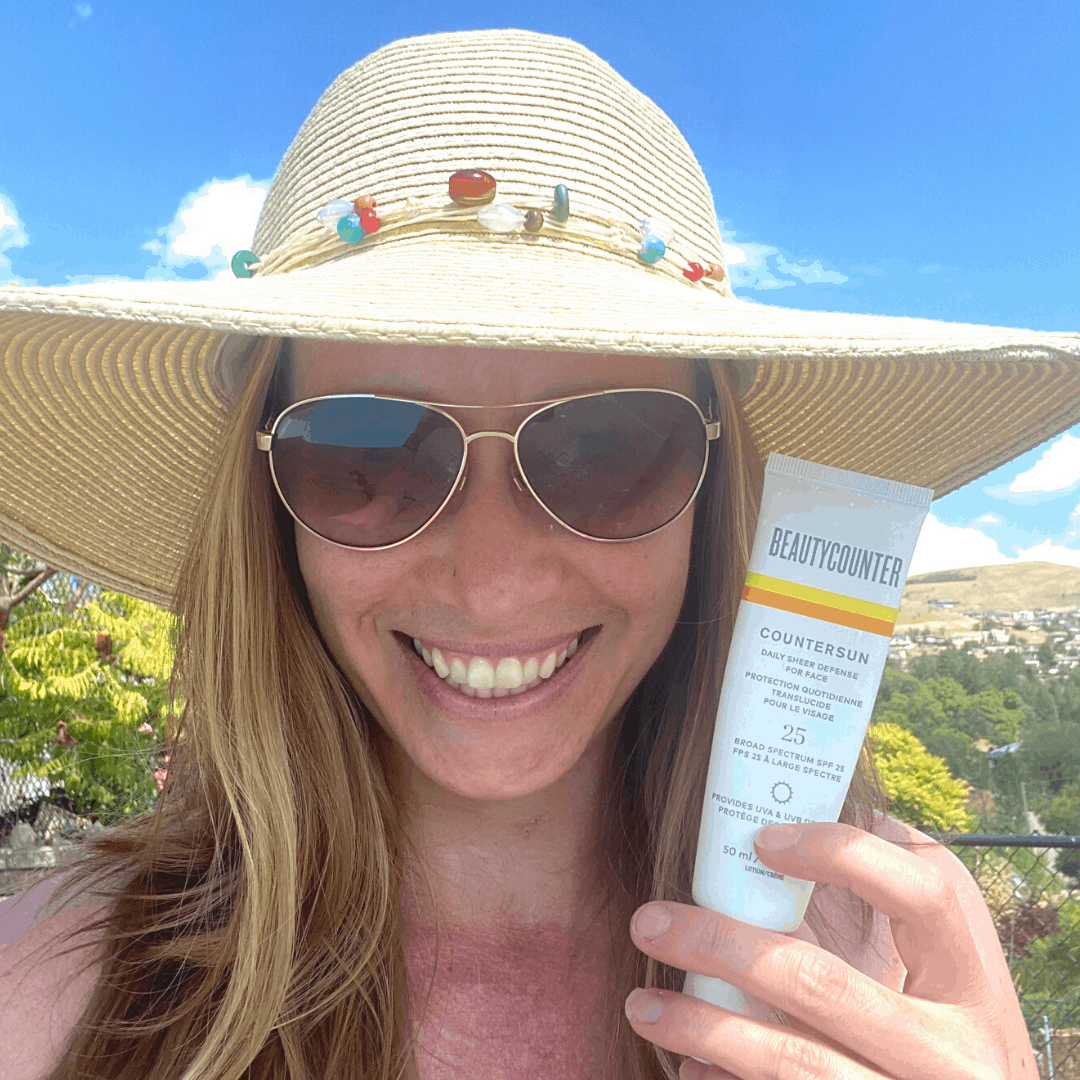
Sunscreen certifications:
All of Beautycounter's sunscreens are Leaping Bunny certified and cruelty free. Most of them are also EWG verified as well. They are also all gluten free. They are all reef safe.
How to use:
One of the biggest issues with mineral sunscreens it that people don’t tend to use them properly, so here is a quick review on how to use mineral sunscreens properly.
Shake before using
With any of the lotions or sprays, you want to shake them before using. The zinc oxide tends to settle at the bottom of the bottle, so to re-distribute it more evenly throughout the product simply give the bottle a shake before dispensing.
If you are using the spray, simply spray it on and then rub it on your skin to distribute it evenly.
Apply 15 minutes before going outside
This is a good rule of thumb for any sunscreen. Doing this allows enough time for the sunscreen to bind to your skin for the best protection.
Apply liberally
Make sure you cover your skin well when applying sunscreen. If you have kids be sure to help them apply their sunscreen so they don’t miss any spots.
Reapply regularly
You want to be sure to reapply the Beautycounter sunscreen regularly. If you are out in the sun you want to reapply your sunscreen every 90-120 minutes, or anytime after you’ve been in the water or if you’ve been sweating in large amounts.
The same applies to face lotions with SPF. Many people are fooled into thinking that their skin will be protected all day if they put their face lotion on in the morning. This just isn’t true. In order to be protected you would still need to re-apply that product throughout the day, the same as any other SPF product.
How to buy:
You can purchase Beautycounter's sunscreen through the link below.
The prices of the sunscreen range from $22 USD to $46 USD depending on the product you are looking for.
They have also been kind enough to give me a 20% off code for you to use which will work for anyone that hasn't purchased Beautycounter products before.
Other ways to help protect your skin from the sun:
Besides using sunscreen, there are a few other things you can do to help protect your skin from sun damage including:
- Use a vitamin C serum: Vitamin C serums helps decrease sun damage from UVA and UVB rays and prevent sun damage by neutralizing free radicals, an effect which is not seen with sunscreens – under laboratory conditions, the application of 10% topical vitamin C shows reduction of UVB-induced redness by 52% and sunburn cell formation by 40-60%. You can learn more about my favourite vitamin C serum and see my before and after photos here.
- Increase your omega-3 intake: Omega 3 fatty acids are great for skin health. Omega-3 supplementation has been found to help treat acne, psoriasis, dermatitis, eczema and a number of other skin conditions and increased omega 3 intake has been shown to help prevent sun damage in the skin.
- Wear a hat: If possible wear one with a wide brim to help protect yourself as much as possible.
Frequently asked questions:
Yes! It's formulated with non-nano zinc oxide, and is made without fragrances, parabens or phthalates. Every batch is also tested for contaminants to ensure it's truly safe.
Beautycounter’s sunscreens are broad spectrum. They protect your skin from both UVA and UVB light and some of them also protect the skin from blue light.
Nano particles are very tiny particles, so the term non-nano means that the zinc oxide used in the sunscreen is large enough that the particles won’t penetrate the skin or be easily inhaled and is thus better for your health.
All of Beautycounter's products come with a best before date on the bottle. The sunscreen is typically good for 2 years or more.
Yes it is made with non-nano zinc oxide.
Yes it is.
Since you made it this far we are basically best friends so be sure to follow me on Instagram, Pinterest, TikTok and Facebook where I share even more recipes and healthy living tips!
Other health info you will like:
- The Beautycounter Deodorant – why it’s the best non-toxic deodorant!
- Beautycounter vitamin C serum review and results
- Is there mercury in your mascara?
- Beautycounter Overnight Resurfacing Peel Review
- Beautycounter Charcoal Mask Review
Our expertise:
Dr. Erin Carter, MD, FRCPC, is a physician with board certifications in internal medicine and rheumatology. She is passionate about environmental health and low toxicity living and has been doing research and publishing information in this area for years.

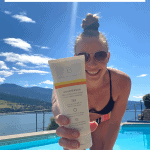
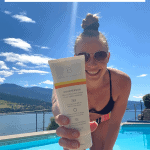
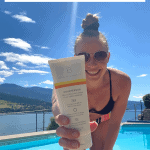
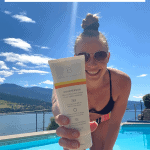

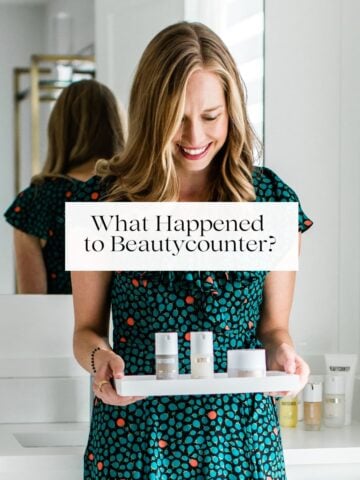


Leave a Reply